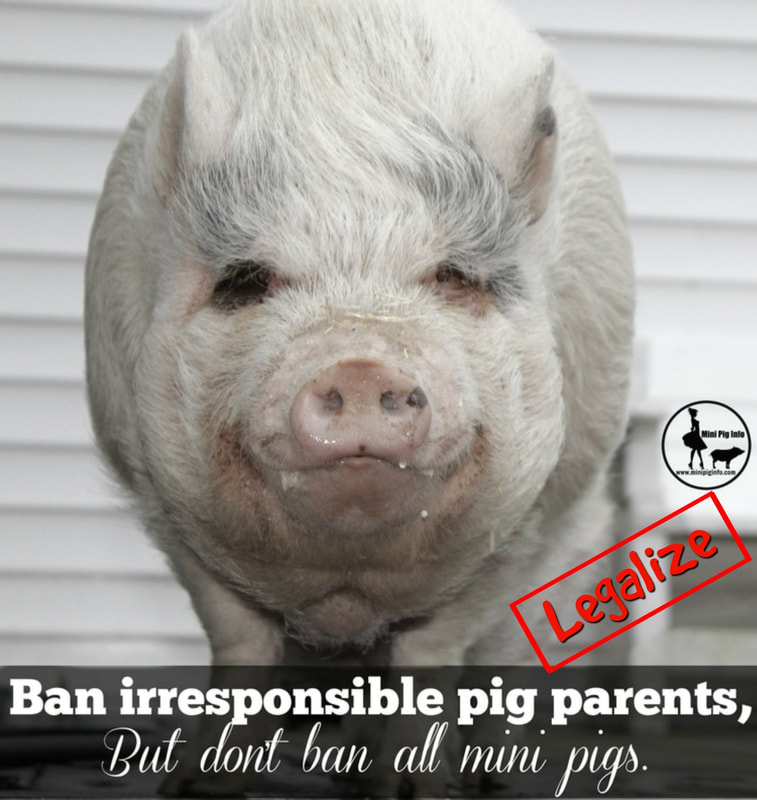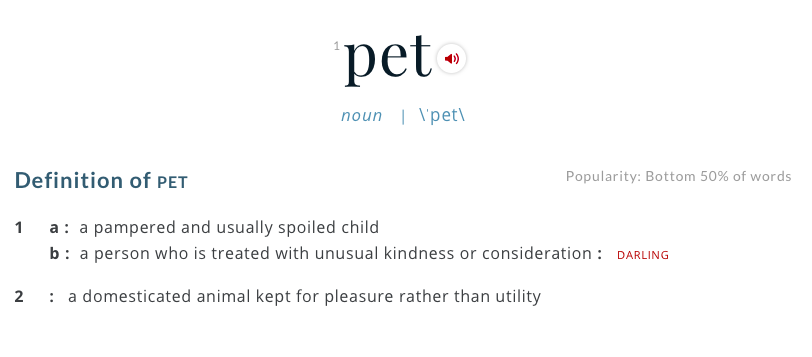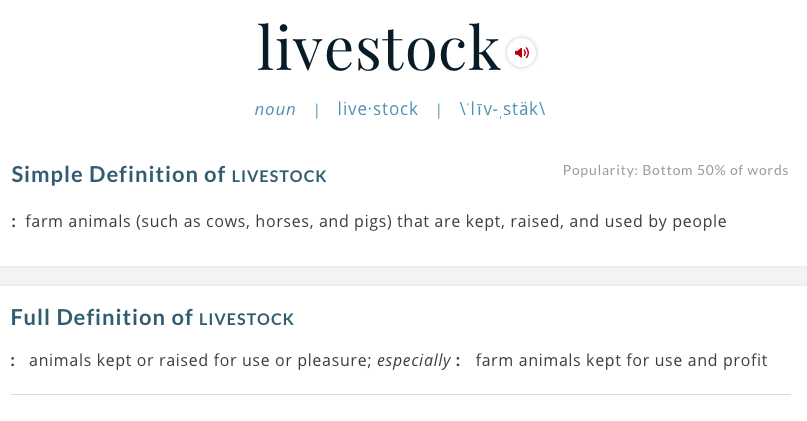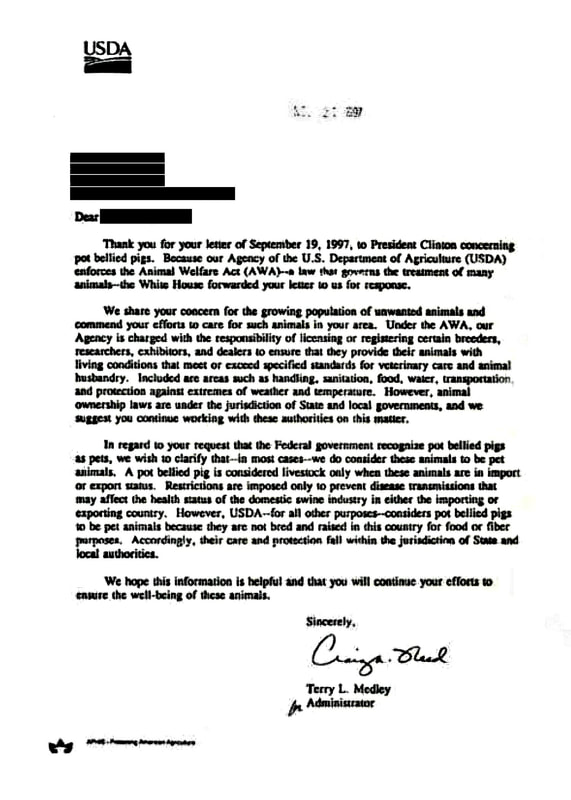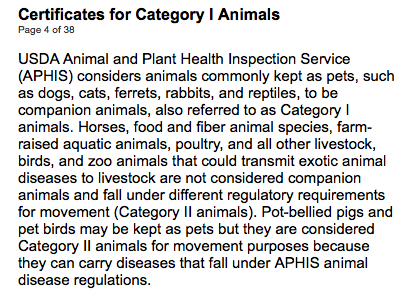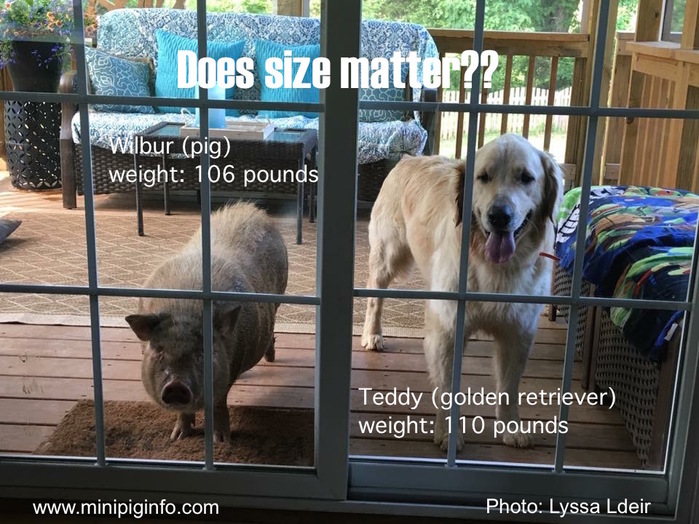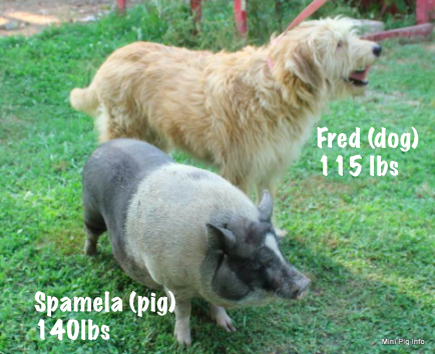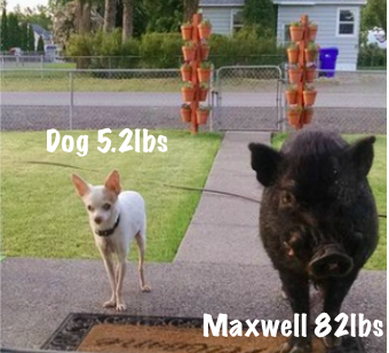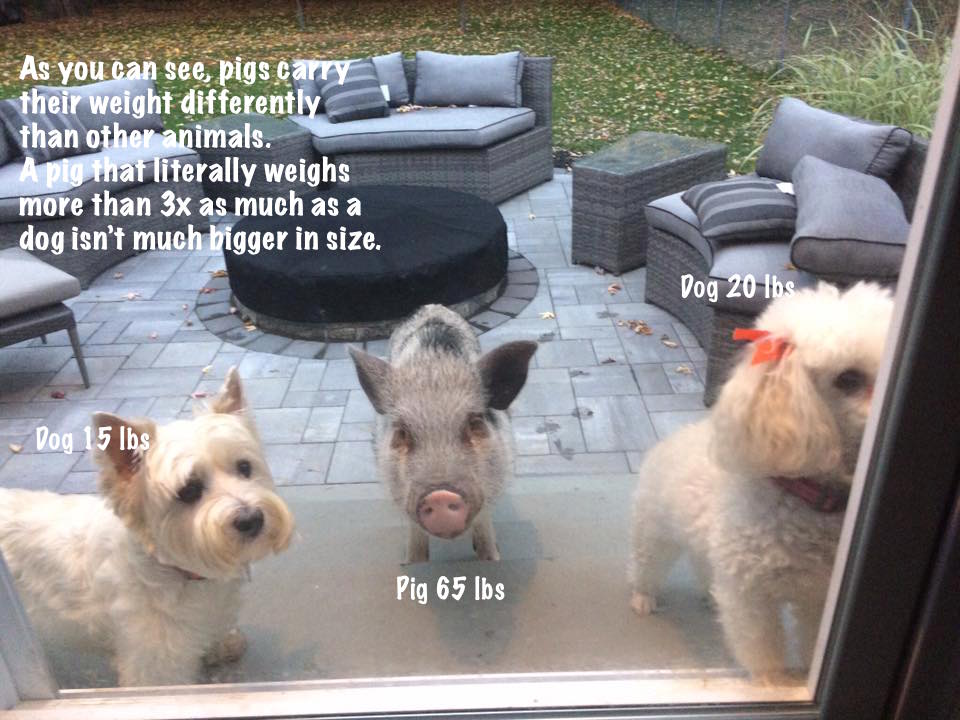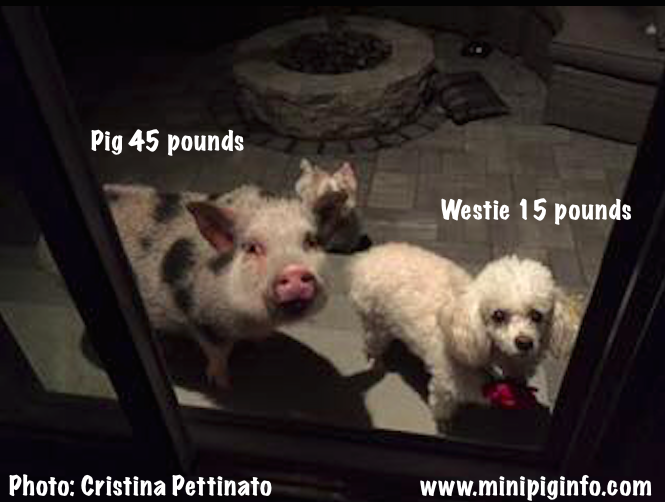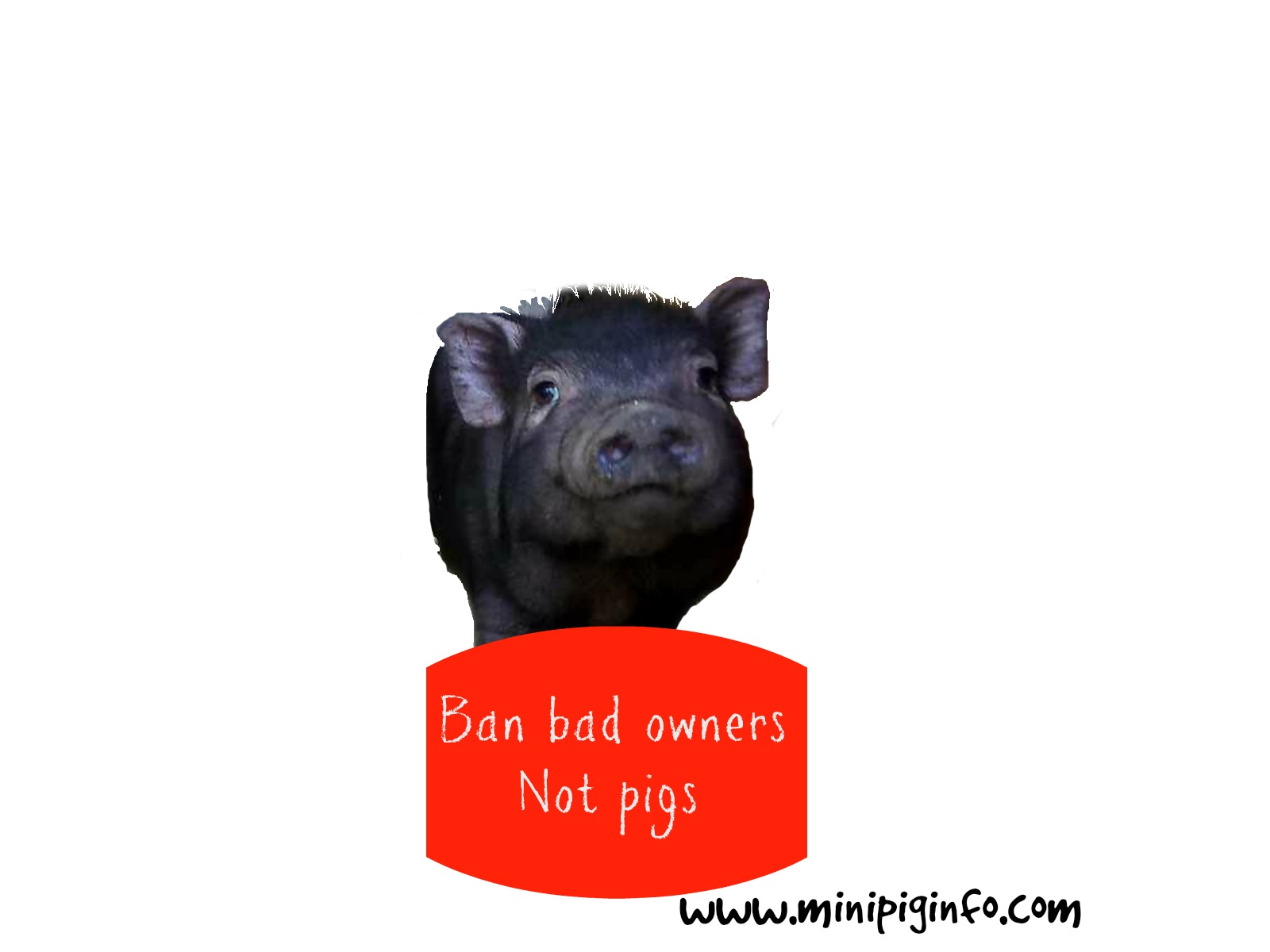Where do you begin the process?
Whether they’re city council members, state representatives or U.S. Senators, elected officials care (or ought to care) what their constituents think. By sending letters and e-mails supporting pro-animal measures that are already on the legislative agenda, you can help convince these politicians that the voters, who put them in office, want to see animals protected from cruelty and neglect. And if there are no pro-animal items on the agenda, you can help change that. But first, you’ll need to do some homework. These officials need to know why it is important to you to have the city recognize your pig or someone's pig as a companion pet and not livestock. This might not concern them in the grand scheme of things, but you need to research first to see what ordinances are already in place.
Lay the Groundwork
Before approaching an elected official (which your city council is) to advocate for specific legislation/ordinance amendments:
Education
Educating yourself and arming yourself with the means to speak intelligently on behalf of pigs will serve you well. Going in unprepared with inaccurate "facts" or information that isn't applicable will not help. Be direct, concise and accurate. Know what ordinances are in place for surrounding areas so you can reference their ordinances and look up the meeting minutes from the revision to that cities ordinance and see what was presented. Having too much information at your disposal has never been a problem. Overwhelming the council with unneeded information is NOT a good thing, so make an outline with key points you want to make and stick to that. Should there be any questions, you want to be able to reference the answers if you do not know off hand. And if you cannot find what they're asking for, ask for an extension or delay so you are better able to respond with accurate information. We can help you research and find the information your city council may ask for if it's not already here.
Make Contact
Lobbying is nearly impossible without personal contact and you are not trying to change a statewide bill, your target is people on the city council, so they typically have an office somewhere within the city, call the councilman's office and schedule an appointment. Making this initial contact will allow you to gauge how the other councilmen may react to your proposal. While you may feel most comfortable attending the appointment as part of a group, it is advisable to go alone or with just a few others. Appoint one person to be the main spokesperson. The following pointers will help the visit go smoothly:
The information you need is scattered below. Our PDF file that you can download to aid you in this journey is below, however, while the facts will be listed, you will still have to do your homework in order to "fill in the blanks" and provide the supporting documentation that will likely be required.
Lay the Groundwork
Before approaching an elected official (which your city council is) to advocate for specific legislation/ordinance amendments:
- Strive to be well informed about the issue so that you come across as credible and knowledgeable. This will require research and possibly contacting others who have worked on similar campaigns in the past.
- Research current relevant laws via the Internet or your local library.
- Find out if there is anyone else in your area working on the same issue — if so, join them, so that efforts will not be duplicated.
- Get a feel for the legislative process. For example, if you are contemplating a county-wide ordinance, contact the county council office for information on enacting legislation. Then attend an open council meeting to become familiar with how they function.
- Establish rapport with legislators’ support staff early on — they are often more accessible than the legislators and can provide good information. Keep all contact brief and professional, remembering to thank them for their time and assistance.
Education
Educating yourself and arming yourself with the means to speak intelligently on behalf of pigs will serve you well. Going in unprepared with inaccurate "facts" or information that isn't applicable will not help. Be direct, concise and accurate. Know what ordinances are in place for surrounding areas so you can reference their ordinances and look up the meeting minutes from the revision to that cities ordinance and see what was presented. Having too much information at your disposal has never been a problem. Overwhelming the council with unneeded information is NOT a good thing, so make an outline with key points you want to make and stick to that. Should there be any questions, you want to be able to reference the answers if you do not know off hand. And if you cannot find what they're asking for, ask for an extension or delay so you are better able to respond with accurate information. We can help you research and find the information your city council may ask for if it's not already here.
- Obtain endorsements from influential individuals and organizations in your community such as the mayor or animal control personnel.
- Prepare well-researched and well-written informational packets that include a factsheet on the proposed reform, include specific information about pigs, addressing any myths and, if possible, a list of endorsements.
- Find advocates in each district and ask them to contact their legislators. Ask constituents to write polite letters to their legislators that demonstrate support for the proposed legislation. Letters that use the constituent’s own words, rather than form letters, postcards or e-mails, will be taken more seriously. Personal letters, preferably sent through the mail, are generally given more weight than e-mails. Advocates can also write letters to the editor of their local newspapers to garner more support for the effort. Find supporters using social media for any others who have a similar interest in amending outdated ordinances to allow pigs to reside within city limits.
Make Contact
Lobbying is nearly impossible without personal contact and you are not trying to change a statewide bill, your target is people on the city council, so they typically have an office somewhere within the city, call the councilman's office and schedule an appointment. Making this initial contact will allow you to gauge how the other councilmen may react to your proposal. While you may feel most comfortable attending the appointment as part of a group, it is advisable to go alone or with just a few others. Appoint one person to be the main spokesperson. The following pointers will help the visit go smoothly:
- Dress professionally.
- Identify yourself as a concerned citizen, pig lover, constituent, business owner, voter or whatever may apply. Remember that legislators prefer to get feedback from people who vote, rather than organized lobbyists.
- Be positive, brief and to the point, supporting your argument with facts. Provide just enough background information to explain the proposal, as public officials are busy and may know little or nothing about the issue. Explain how the proposed bill will have a positive impact on their constituents. Consider showing a short video if it would help illustrate the issue. (We can help you with that as well, we already have one in the works)
- State clearly what you want the legislator to do — sponsor a bill, vote no on an anti-animal amendment, etc. In this case, you would like his/her support in amending an outdated ordinance or having an ordinance put in place to protect your pig.
- Offer to work to publicize the issue and find additional support.
- Leave a packet of information that contains a clear, concise summary of your proposal.
- Always follow-up with a personal thank you to the councilman and support staff after every visit or positive action taken by the legislator.
- If you are speaking publicly at a council meeting or committee hearing, follow the above procedures, keeping your presentation clear and concise.
The information you need is scattered below. Our PDF file that you can download to aid you in this journey is below, however, while the facts will be listed, you will still have to do your homework in order to "fill in the blanks" and provide the supporting documentation that will likely be required.
|
|
| ||||||
We have taken the opportunity to help others and created a blanket change.org petition that anyone can use to assist in their journey to have outdated ordinances amended or ordinances created to protect their pig from being forbid in the future. You can read that petition by clicking here. The petition was launched 02/08/17, so it may take some time before it has a substantial amount of signatures. We hope that once an abundance of supportive signatures is collected, it will send a message to the city council or zoning commission that you are not the only people that would like to have a companion pig. If you need any assistance in obtaining our petition or printing it off, please send us an email and I will be sure to send you the direct link from change.org to allow you access. Please sign our petition to help other families that may be battling their city to keep their pig. We all know how sensitive pigs are and how important it is to support each other in the pig community. (please and thank you)
If you need a letter from our organization for your zoning packet, please reach out to us by email or message us on Facebook. We can easily email you a letter of support, or a letter that is educational in nature, from Mini Pig Info.
If you need a letter from our organization for your zoning packet, please reach out to us by email or message us on Facebook. We can easily email you a letter of support, or a letter that is educational in nature, from Mini Pig Info.
During each public hearing, citizens are invited to speak in support of, or in opposition, to each request. In preparing a presentation, groups or communities sharing similar concerns are encouraged to select representatives to address the Board or Commission. This preparation will assure that all opinions are expressed while avoiding repetitive comments. The public hearing begins with a presentation of the request by a staff member. The applicant then discusses the case. Individuals wishing to speak to the request present their views and the applicant will be permitted closing remarks. The Commission and Board are experienced in balancing development and in protecting area neighborhoods and adjacent properties. They are knowledgeable about traffic, drainage and land transition issues throughout the County. It is important for citizens to provide specific comments about how the request will affect their neighborhood. This is how the system is designed to work. Each voice or concern has the opportunity to speak and plead their case either for or against the ordinance being amended. Click here to see one of our piggy friends entire packet she sent to her city in order to have the ordinance changed to allow pigs within city limits.
One of the first things that needs to be addressed is the definition of livestock and the definition of a pet. (see pictures below from the online Oxford dictionary) The use of word swine or pigs typically refers to meat animals when referring to livestock, potbelly pigs are not meat animals, therefore shouldn't be classified in the same livestock category. They provide nothing but companionship. Livestock indicates there is an underlying use from the animal. Cows and milk, production pigs and meat, etc. The USDA does not regulate potbellied pigs as they're not used as a food source. There is the USDA letter posted on the website that reflects their view, but it is an older letter and I am in the process of writing to them to get this clarified and updated. However, when researching, I came across a document that was written by an animal control officer....it said "it has come to my attention that there is some concern about what constitutes a member of the swine family. No one contests that Chihuahua's or miniature pinscher's are any less of a canine than Great Dane or Mastiff's. In the same vein, mini pigs or potbellied pigs are no less porcine than Hampshire or Yorkshires." And that AC is correct. But, that is not the debate. The debate is whether or not a mini pig is LIVESTOCK, none of us are arguing that they're not swine. I felt it was important to include this information on the page just in case someone brings this up as it is not what we are trying to establish.
One of the issues I have seen is property value decline is conjecture and unsubstantiated. The Appraisers association lists factors, none of which address neighboring pets. On the property values issue, I would recommend adding a few pics of the front, sides and back of the property to show there is no evidence of any animal on the property and no destruction or nuisance associated with having a pig as a pet. I would take pictures of inside accommodations for your pig as well as outside areas. They need to understand this is a pet, certainly not a conventional pet, but a pet nonetheless. Include pictures of your family with you pig, they need to see that pigs aren't nuisance animals, but friendly and adapt to a household much like conventional animals do. Pigs do dig, that is a fact, but a pig rooting up some of YOUR yard isn't problematic, I wouldn't highlight the rooting as a benefit, but certainly include that you have set aside an area for your pig to "be a pig" in your packet so that is addressed and off the table as a possible opposition.
Another issue I've seen people complain about on various threads is the smell of pigs. As pig owners, we know pigs don't sweat or emit a foul odor. Pet pigs and a pig farm are two separate entities and shouldn't be compared. Having 1,2, even 4 pigs will not cause an odor. As a responsible pet owner, you definitely need to be aware of animal waste ordinances and do your part to clean up after your pig. Feces in itself isn't a pleasant smell and this shouldn't be a reason why a pig isn't allowed. All animals urinate and defecate and owners need to be sure to clean up after their animals.
Some cities allow pigs while the HOA does not. You are responsible for checking out any agreements you sign when moving into a house or neighborhood, if you moved to an area where there is a homeowners association, be sure to look at the pet section and try and handle that before you get a pig, to save on court costs and heartbreak. You cannot break the rules because you decide you want a pet pig and they've already forbid that type of pet. You can ask beforehand for a waiver, but do not try to "hide" a pig, eventually you will be caught and then you'll have to find another home or fight to keep your pig.
An additional comment I've seen posted is regarding aggression and pigs. ANY animal has the potential to be aggressive without proper training. Pigs are no different. I would collect information from animal control about animal bites over the last several years and compare that to how many of those were bites from a pig. (Hopefully that number will be zero). Pigs are not known to be aggressive animals by nature, feral pigs have been known to be aggressive, but thats to protect themselves, pigs don't seek trouble under routine circumstances. Take a video of your pig playing in the yard, ask others to share their videos of their pigs playing with their families, other pigs, at community events, like kiss the pig events, or pigs that visit nursing facilities, etc. Show them domesticated pigs don't typically have aggression like wild animals do.
If you have started a petition on change.org, I would include that in your packet you submit to your county/city. I would also ask supporters to email you, neighbors to write letters of support and have any supporters accompany you to the hearing. The city/county needs to know you're not alone. There are 1000's of other people who love pigs and treat them as part of the family. Ask others in the pig community to share stories and pictures that can be included. The elected officials may need to be educated on how smart pigs are or the fact they bond with their human family and grieve when removed. Let them know about the pig community and educational resources available to you, them and anyone else who is considering getting a pig as a pet.
Provide documentation from your vet with a clean bill of heath. Check the other pet restrictions and be sure if they're required to have vaccinations so that your pig is in compliance. Be sure to check the animal welfare rules to ensure you have all the appropriate accommodations your city/county requires. Make sure they know the pig is contained, lives IN the house although may have accommodations outside for extreme temperatures. Due diligence will help you with your case. Checking rules and restrictions for other animals will point you in the direction you need to go. Although a pig is not a dog, in terms of having a pet, they're treated much the same, so be sure you know the ordinances for dogs and be sure that you have done everything you can to be complaint with the rules pertaining to other domesticated/traditional pets. One additional issue that has been brought to my attention recently is that there is no vaccination for rabies that is approved for the use in pigs. This is true. The dog vaccination is commonly used "off-label" to protect pigs from contracting this deadly disease, but there is no scientific research that concludes it is effective since many pigs never receive the vaccination and only a handful of pigs have tested + for rabies.
Be sure to let them know other cities/counties DO allow pet pigs within city limits.
http://www.ljworld.com/news/2012/jan/some-pigs-city-allows-potbellied-swines-pets
Here are some other success stories you may want to include in your packet
http://articles.latimes.com/1997/dec/pigstays/local/me
http://abcnews.go.com/US/florida-family-fights-potbellied-pet-pig/story
http://wilbursardo.com
http://www.nbcnews.com/us_news-life/t/swine-get-break-colorado-springs
http://www.chron.com/news/houston-texas/article/Familys-pot-bellied-pig-can-stay-despite
http://tucsoncitizen.com/2007/board-ruling-lets-family-keep-beloved-pet-pig
http://www.newspressnow.com/news/locals-tjoseph-allows-petpigs_
http://articles.latimes.com/2013/nov/03/local/la-me-sierramadre-pig
Look up ordinances in neighboring cities in your area, see if any allow pigs and include those cities in your packet. Collect additional information about those cities such as licensing requirements and fees. Offer to be a mentor in your area for other pig parents, let the city know you're passionate and care about these animals like they are your children and how the pig community is strong and helps each other. Ask for regulations in breeding of pigs in your area, discuss the amount of space, realistically, a pig needs. Another concern is that animal controls are not prepared to handle pigs in their facilities and those hard concrete floors aren't ideal for pigs either. Come up with useful alternatives, find a network of foster parents in your area so the city can call prepared and knowledgable people to help car for pigs that are found to be strays or unwanted. Prepare with shelter guides for the animal control centers in your area.(You can download and print off our shelter guide by clicking here) Also let them know that not everyone should have a pig, they're intelligent animals that need constant stimulation, but for the right families that are prepared, they likely won't have any negative repercussions from allowing them to live within city limits. Collecting as much information as you can regarding the differences and similarities between the "typical" domesticated pets and your pet pig can truly show these people how much pigs mean to not only you, but also a whole community of people. Get letters from your veterinarian that demonstrates the relationship and responsibility you have taken to ensure your pig is well cared for and appropriately taken care of.
This city asked very specific questions and did research to answer their questions. Perhaps being on top of this and having appropriate documentation to address these up front would be useful. The questions are 1. Is a miniature pig a farm animal? 2. If a miniature pig is not a farm animal, does it behave similarly to other domesticated animals, therefore it could be considered a pet? Attached with the packet is his presentation which helped to change the ordinance in his county. http://www.midland-mi.org/government/commissions/meetings/.pdf. If you are unable to open that link for any reason, we are also attaching a file with the same information within. See below for "zoning commission paperwork PDF. Take pictures of your pig with you, take pictures compared to the size of various dogs, all of this will help you establish key size differences. While 150lbs sounds like a lot, compared to a dog weighing the same amount, and because pigs are such dense animals, 150lbs isn't what they think it is.
Some family's have chose to relocate to an area that is already zoned to allow pigs or doesn't have an ordinance in place forbidding them, but many have been successful in changing the minds of the officials simply by using facts and supporting their case with data they collect and information thats available. The next page is Ann Varner's packet that she submitted to her city and won. She used various documents and emails from supporters along with her general knowledge of pigs. She was prepared. If you don't have a basic understanding of pigs or pig behavior, it would be worthwhile for you to research or read this sites information about pigs in general and arm yourself with facts. Please let us know if we can be of help to you and good luck! Starting a petition, such as change.org, can be helpful in showing your county/city that there are other pig owners who are supportive of your decision to keep a pig as a pet. Asking your neighbors to write emails or letters of support are also helpful, but make sure you have all the info you need BEFORE petitioning the city to amend or change the ordinance.
One of the first things that needs to be addressed is the definition of livestock and the definition of a pet. (see pictures below from the online Oxford dictionary) The use of word swine or pigs typically refers to meat animals when referring to livestock, potbelly pigs are not meat animals, therefore shouldn't be classified in the same livestock category. They provide nothing but companionship. Livestock indicates there is an underlying use from the animal. Cows and milk, production pigs and meat, etc. The USDA does not regulate potbellied pigs as they're not used as a food source. There is the USDA letter posted on the website that reflects their view, but it is an older letter and I am in the process of writing to them to get this clarified and updated. However, when researching, I came across a document that was written by an animal control officer....it said "it has come to my attention that there is some concern about what constitutes a member of the swine family. No one contests that Chihuahua's or miniature pinscher's are any less of a canine than Great Dane or Mastiff's. In the same vein, mini pigs or potbellied pigs are no less porcine than Hampshire or Yorkshires." And that AC is correct. But, that is not the debate. The debate is whether or not a mini pig is LIVESTOCK, none of us are arguing that they're not swine. I felt it was important to include this information on the page just in case someone brings this up as it is not what we are trying to establish.
One of the issues I have seen is property value decline is conjecture and unsubstantiated. The Appraisers association lists factors, none of which address neighboring pets. On the property values issue, I would recommend adding a few pics of the front, sides and back of the property to show there is no evidence of any animal on the property and no destruction or nuisance associated with having a pig as a pet. I would take pictures of inside accommodations for your pig as well as outside areas. They need to understand this is a pet, certainly not a conventional pet, but a pet nonetheless. Include pictures of your family with you pig, they need to see that pigs aren't nuisance animals, but friendly and adapt to a household much like conventional animals do. Pigs do dig, that is a fact, but a pig rooting up some of YOUR yard isn't problematic, I wouldn't highlight the rooting as a benefit, but certainly include that you have set aside an area for your pig to "be a pig" in your packet so that is addressed and off the table as a possible opposition.
Another issue I've seen people complain about on various threads is the smell of pigs. As pig owners, we know pigs don't sweat or emit a foul odor. Pet pigs and a pig farm are two separate entities and shouldn't be compared. Having 1,2, even 4 pigs will not cause an odor. As a responsible pet owner, you definitely need to be aware of animal waste ordinances and do your part to clean up after your pig. Feces in itself isn't a pleasant smell and this shouldn't be a reason why a pig isn't allowed. All animals urinate and defecate and owners need to be sure to clean up after their animals.
Some cities allow pigs while the HOA does not. You are responsible for checking out any agreements you sign when moving into a house or neighborhood, if you moved to an area where there is a homeowners association, be sure to look at the pet section and try and handle that before you get a pig, to save on court costs and heartbreak. You cannot break the rules because you decide you want a pet pig and they've already forbid that type of pet. You can ask beforehand for a waiver, but do not try to "hide" a pig, eventually you will be caught and then you'll have to find another home or fight to keep your pig.
An additional comment I've seen posted is regarding aggression and pigs. ANY animal has the potential to be aggressive without proper training. Pigs are no different. I would collect information from animal control about animal bites over the last several years and compare that to how many of those were bites from a pig. (Hopefully that number will be zero). Pigs are not known to be aggressive animals by nature, feral pigs have been known to be aggressive, but thats to protect themselves, pigs don't seek trouble under routine circumstances. Take a video of your pig playing in the yard, ask others to share their videos of their pigs playing with their families, other pigs, at community events, like kiss the pig events, or pigs that visit nursing facilities, etc. Show them domesticated pigs don't typically have aggression like wild animals do.
If you have started a petition on change.org, I would include that in your packet you submit to your county/city. I would also ask supporters to email you, neighbors to write letters of support and have any supporters accompany you to the hearing. The city/county needs to know you're not alone. There are 1000's of other people who love pigs and treat them as part of the family. Ask others in the pig community to share stories and pictures that can be included. The elected officials may need to be educated on how smart pigs are or the fact they bond with their human family and grieve when removed. Let them know about the pig community and educational resources available to you, them and anyone else who is considering getting a pig as a pet.
Provide documentation from your vet with a clean bill of heath. Check the other pet restrictions and be sure if they're required to have vaccinations so that your pig is in compliance. Be sure to check the animal welfare rules to ensure you have all the appropriate accommodations your city/county requires. Make sure they know the pig is contained, lives IN the house although may have accommodations outside for extreme temperatures. Due diligence will help you with your case. Checking rules and restrictions for other animals will point you in the direction you need to go. Although a pig is not a dog, in terms of having a pet, they're treated much the same, so be sure you know the ordinances for dogs and be sure that you have done everything you can to be complaint with the rules pertaining to other domesticated/traditional pets. One additional issue that has been brought to my attention recently is that there is no vaccination for rabies that is approved for the use in pigs. This is true. The dog vaccination is commonly used "off-label" to protect pigs from contracting this deadly disease, but there is no scientific research that concludes it is effective since many pigs never receive the vaccination and only a handful of pigs have tested + for rabies.
Be sure to let them know other cities/counties DO allow pet pigs within city limits.
http://www.ljworld.com/news/2012/jan/some-pigs-city-allows-potbellied-swines-pets
Here are some other success stories you may want to include in your packet
http://articles.latimes.com/1997/dec/pigstays/local/me
http://abcnews.go.com/US/florida-family-fights-potbellied-pet-pig/story
http://wilbursardo.com
http://www.nbcnews.com/us_news-life/t/swine-get-break-colorado-springs
http://www.chron.com/news/houston-texas/article/Familys-pot-bellied-pig-can-stay-despite
http://tucsoncitizen.com/2007/board-ruling-lets-family-keep-beloved-pet-pig
http://www.newspressnow.com/news/locals-tjoseph-allows-petpigs_
http://articles.latimes.com/2013/nov/03/local/la-me-sierramadre-pig
Look up ordinances in neighboring cities in your area, see if any allow pigs and include those cities in your packet. Collect additional information about those cities such as licensing requirements and fees. Offer to be a mentor in your area for other pig parents, let the city know you're passionate and care about these animals like they are your children and how the pig community is strong and helps each other. Ask for regulations in breeding of pigs in your area, discuss the amount of space, realistically, a pig needs. Another concern is that animal controls are not prepared to handle pigs in their facilities and those hard concrete floors aren't ideal for pigs either. Come up with useful alternatives, find a network of foster parents in your area so the city can call prepared and knowledgable people to help car for pigs that are found to be strays or unwanted. Prepare with shelter guides for the animal control centers in your area.(You can download and print off our shelter guide by clicking here) Also let them know that not everyone should have a pig, they're intelligent animals that need constant stimulation, but for the right families that are prepared, they likely won't have any negative repercussions from allowing them to live within city limits. Collecting as much information as you can regarding the differences and similarities between the "typical" domesticated pets and your pet pig can truly show these people how much pigs mean to not only you, but also a whole community of people. Get letters from your veterinarian that demonstrates the relationship and responsibility you have taken to ensure your pig is well cared for and appropriately taken care of.
This city asked very specific questions and did research to answer their questions. Perhaps being on top of this and having appropriate documentation to address these up front would be useful. The questions are 1. Is a miniature pig a farm animal? 2. If a miniature pig is not a farm animal, does it behave similarly to other domesticated animals, therefore it could be considered a pet? Attached with the packet is his presentation which helped to change the ordinance in his county. http://www.midland-mi.org/government/commissions/meetings/.pdf. If you are unable to open that link for any reason, we are also attaching a file with the same information within. See below for "zoning commission paperwork PDF. Take pictures of your pig with you, take pictures compared to the size of various dogs, all of this will help you establish key size differences. While 150lbs sounds like a lot, compared to a dog weighing the same amount, and because pigs are such dense animals, 150lbs isn't what they think it is.
Some family's have chose to relocate to an area that is already zoned to allow pigs or doesn't have an ordinance in place forbidding them, but many have been successful in changing the minds of the officials simply by using facts and supporting their case with data they collect and information thats available. The next page is Ann Varner's packet that she submitted to her city and won. She used various documents and emails from supporters along with her general knowledge of pigs. She was prepared. If you don't have a basic understanding of pigs or pig behavior, it would be worthwhile for you to research or read this sites information about pigs in general and arm yourself with facts. Please let us know if we can be of help to you and good luck! Starting a petition, such as change.org, can be helpful in showing your county/city that there are other pig owners who are supportive of your decision to keep a pig as a pet. Asking your neighbors to write emails or letters of support are also helpful, but make sure you have all the info you need BEFORE petitioning the city to amend or change the ordinance.
| zoning_commision_paperwork.pdf |
Current rules regarding pigs across the US.
http://www.raising-pigs.com/pig-laws.pdf
http://www.raising-pigs.com/pig-laws.pdf
Begin with the definition of a mini pig being a pet rather than livestock.
Here is a letter from the USDA regarding potbellied pigs. They do NOT regulate potbellied pigs because they are PETS and not consumed in the US.
The latest statement from the USDA in response to a question asking whether miniature potbellied pigs are considered livestock or pets?
For the purposes of USDA's animal disease surveillance, response, and control activities, as well as our import/export requirements, pot-bellied pigs are classified as “swine,” which are considered “livestock” under the broad authority of the Animal Health Protection Act. Definitions and associated regulations for our animal disease regulatory programs are primarily found in title 9 of the Code of Federal Regulations. Some species of animals are commonly kept as household pets but are susceptible to diseases that are subject to control or eradication by USDA's Animal and Plant Health Inspection Service (APHIS). For example, pot-bellied pigs are susceptible to the same diseases as farm-raised swine, such as pseudorabies. Further information about specific diseases of concern can be found at https://www.aphis.usda.gov/aphis/ourfocus/animalhealth/animal-disease-information
APHIS also enforces the Animal Welfare Act (AWA). The AWA requires that minimum standards of care and treatment be provided for certain, warm-blooded animals bred for commercial sale, used in research, transported commercially, or exhibited to the public. Although pot-bellied pigs intended for use as food or fiber would be exempt from AWA regulation, if the animals are being used for a purpose covered by the AWA—for exhibition or research, for example—they would be subject to AWA regulation. However, the AWA does not cover pot-bellied pigs used as companion animals or pets.
State or local governments typically regulate companion and farm animals. Local municipalities also enforce zoning laws, which may or may not classify pot-bellied pigs as agricultural animals. Accordingly, we suggest that you contact authorities in your State and local government offices for information about any laws that apply to pot-bellied pigs. You can find contact information on the right side of the U.S. Government’s official Web portal, www.usa.gov.
We hope this information is helpful. For further information about APHIS's animal health and welfare mission and activities, we encourage you to visit www.aphis.usda.gov
Published 03/04/2011
http://www.usda.gov/wps/portal/usda/ASK_EXPERT
For the purposes of USDA's animal disease surveillance, response, and control activities, as well as our import/export requirements, pot-bellied pigs are classified as “swine,” which are considered “livestock” under the broad authority of the Animal Health Protection Act. Definitions and associated regulations for our animal disease regulatory programs are primarily found in title 9 of the Code of Federal Regulations. Some species of animals are commonly kept as household pets but are susceptible to diseases that are subject to control or eradication by USDA's Animal and Plant Health Inspection Service (APHIS). For example, pot-bellied pigs are susceptible to the same diseases as farm-raised swine, such as pseudorabies. Further information about specific diseases of concern can be found at https://www.aphis.usda.gov/aphis/ourfocus/animalhealth/animal-disease-information
APHIS also enforces the Animal Welfare Act (AWA). The AWA requires that minimum standards of care and treatment be provided for certain, warm-blooded animals bred for commercial sale, used in research, transported commercially, or exhibited to the public. Although pot-bellied pigs intended for use as food or fiber would be exempt from AWA regulation, if the animals are being used for a purpose covered by the AWA—for exhibition or research, for example—they would be subject to AWA regulation. However, the AWA does not cover pot-bellied pigs used as companion animals or pets.
State or local governments typically regulate companion and farm animals. Local municipalities also enforce zoning laws, which may or may not classify pot-bellied pigs as agricultural animals. Accordingly, we suggest that you contact authorities in your State and local government offices for information about any laws that apply to pot-bellied pigs. You can find contact information on the right side of the U.S. Government’s official Web portal, www.usa.gov.
We hope this information is helpful. For further information about APHIS's animal health and welfare mission and activities, we encourage you to visit www.aphis.usda.gov
Published 03/04/2011
http://www.usda.gov/wps/portal/usda/ASK_EXPERT
This blurb on the USDA website (link below) does state potbellied pigs may be kept as PETS, but are considered category II animals due to the potential of carrying disease, therefore requiring health certificates. But the overall tone of the statement itself demonstrates that the USDA recognizes mini pigs as pets.
https://www.aphis.usda.gov/animal_health/vet_accreditation
https://www.aphis.usda.gov/animal_health/vet_accreditation
Does size matter?
Sometimes its easier for someone to visualize the size of a "mini" pig to see when the term pig is used in regards to being a pet so they can understand why you have a pet pig or even why you want a pet pig. These are pictures others have shared with us that may be helpful to you when trying to visually show the zoning commission a comparison picture that accurately demonstrates the size of a pig. Since size cannot be guaranteed, restrictions on sizes of pigs should not be encouraged. However, if a city/county/town needs to have restrictions in order to control the type of pigs they will allow, ask them to consider using the term "mini" pig or specific breeds such as potbellied pig or kunekune. Feel free to print off any information we have with regards to the care of pigs. We do have a packet for others to download (above) in order to help with these battles with a guide on how you can effectively present your case to the city council in order to address their concerns while also clarifying any misunderstandings they may have about pigs.
Scientific studies that conclude that pigs aren't much different from other traditional companion pets? Yes there are published documents that state just that. Here is an example of one below.
With intriguing descriptions of the abilities of pigs, a new white paper concludes that “pigs are not very different from the dogs and cats we share our homes with. They may even be not very different from ourselves.”
Written by Kimmela Executive Director Lori Marino and Emory University Prof. Christina M. Colvin, the paper is entitled Thinking Pigs: Cognition, Emotion, and Personality – An Exploration of the Cognitive Complexity of Sus Domesticus, The Domestic Pig.
The authors conclude that pigs:
Dr. Marino explains that “We have shown that pigs share a number of cognitive capacities with other highly intelligent species such as dogs, chimpanzees, elephants, dolphins, and even humans. There is good scientific evidence to suggest we need to rethink our overall relationship to them.”
Based on the authors’ review paper published in the International Journal of Comparative Psychology in 2015, this is the first white paper from The Someone Project.
Source: http://www.kimmela.org/2016/07/14/new-scientific-white-paper-concludes-that-pigs-are-behaviorally-cognitively-and-emotionally-complex-individuals
The published study:
http://www.kimmela.org/wp-content/uploads/2016/07/Someone-Project_PIGS_WhitePaper.pdf
To download and print the PDF file, click the download file link below.
With intriguing descriptions of the abilities of pigs, a new white paper concludes that “pigs are not very different from the dogs and cats we share our homes with. They may even be not very different from ourselves.”
Written by Kimmela Executive Director Lori Marino and Emory University Prof. Christina M. Colvin, the paper is entitled Thinking Pigs: Cognition, Emotion, and Personality – An Exploration of the Cognitive Complexity of Sus Domesticus, The Domestic Pig.
The authors conclude that pigs:
- have excellent long-term memories;
- have a sense of time, remember specific episodes in their past, and anticipate future events;
- are whizzes with mazes and other tests requiring location of desired objects;
- love to play and engage in mock fighting with each other, similar to play in dogs and other mammals;
- live in complex social communities where they keep track of other individuals, both pigs and humans, and learn from one another;
- cooperate with one another and show signs of Machiavellian intelligence such as perspective-taking and tactical deception;
- are emotional and exhibit empathy;
- have distinct personalities.
Dr. Marino explains that “We have shown that pigs share a number of cognitive capacities with other highly intelligent species such as dogs, chimpanzees, elephants, dolphins, and even humans. There is good scientific evidence to suggest we need to rethink our overall relationship to them.”
Based on the authors’ review paper published in the International Journal of Comparative Psychology in 2015, this is the first white paper from The Someone Project.
Source: http://www.kimmela.org/2016/07/14/new-scientific-white-paper-concludes-that-pigs-are-behaviorally-cognitively-and-emotionally-complex-individuals
The published study:
http://www.kimmela.org/wp-content/uploads/2016/07/Someone-Project_PIGS_WhitePaper.pdf
To download and print the PDF file, click the download file link below.
| someone-project_pigs_whitepaper.pdf |

